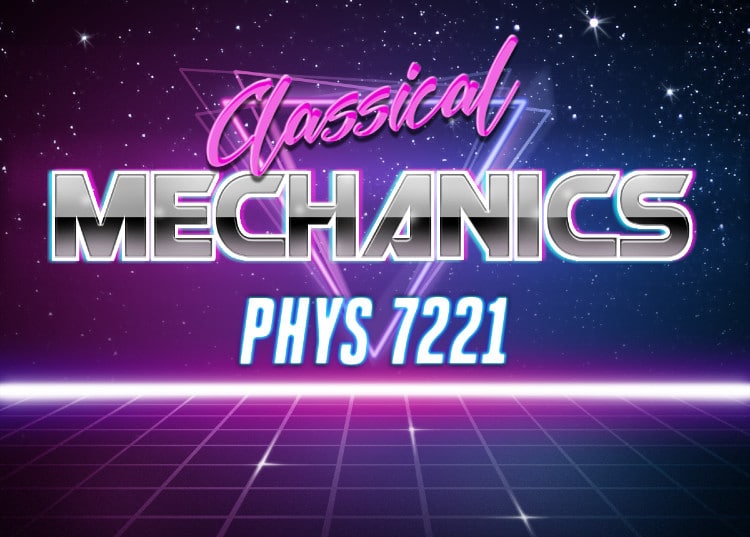PHYS 7221 - Fall 2022
Classical Mechanics Fall 2022

- Prof. Justin H. Wilson
- Email: jhwilson@lsu.edu
- Pronouns: He/They
Academic Integrity
Louisiana State University adopted the Commitment to Community in 1995 to set forth guidelines for student behavior both inside and outside of the classroom. The Commitment to Community charges students to maintain high standards of academic and personal integrity. All students are expected to read and be familiar with the LSU Code of Student Conduct and Commitment to Community, found online at lsu.edu/saa. It is your responsibility as a student at LSU to know and understand the academic standards for our community.
Students who are suspected of violating the Code of Conduct will be referred to the office of Student Advocacy & Accountability. For graduate students, a first violation leads to deferred suspension for at least two semesters and a failing grade in the course.
Course description
Classical mechanics sets the groundwork for the study of physics: From particles, to materials, to celestial bodies. The ideas and techniques have resounding implications. For example, the principle of least action we will develop has profound origins within quantum theory and chaotic dynamics is precisely defined (though still being understood). Lastly, we will be building intuition for physical problems as well as mathematical intuition which are applicable outside of the particulars of this course.
Course information
- Lectures: T/Th 10:30am-11:50am, 106 Nicholson
- Office Hours: W 10:30am-12:00pm or by appointment
Course outline
- Lagrangian Mechanics
- Symmetries and Conservation Laws
- The central force problem
- Oscillations
- Hamiltonian Mechanics
- Rigid body dynamics
- Chaotic dynamics (subject to time availability)
Books
Main course text: Classical Mechanics, 3rd ed. by Goldstein, Poole, and Safko. Corrections at http://astro.physics.sc.edu/goldstein/
Supplementary texts:
- Mechanics by L.D. Landau and E.M. Lifshitz
- Mathematical Methods of Classical Mechanics, 2nd ed. by V.I. Arnold
- Theoretical Mechanics of Particles and Continua by Fetter and Walecka
- Nonlinear Dynamics and Chaos by Strogatz
Exams, homeworks, and grades
The breakdown of grades will be
- 35% Homework
- 25% Midterm
- 40% Final exam Practice exam
Midterm - Oct 18 in class
The midterm will cover the content of the first six homeworks (Lagrangian mechanics, constraints, the central force problem, Noether’s theorem, scattering, and small oscillations).
Homeworks
Every homework will have one question taking from the test bank for the qualifier.
You can work on the homework in groups, but everyone needs to write-up their own solutions. When stepping through logic and math, use complete sentences and explain what you are doing.
Homeworks use the class file jhwhw.cls. See this stack exchange post for information on how to use it.
Grading policy
Typical due dates for homeworks will be Tuesday at the beginning of class unless otherwise specified. Late homework will be counted but at most 50% of points can be obtained.
Revisiting homework: To obtain 50% of the points lost in a homework assignment, you may “correct” your homework problems. This should not be done in a group or outside consultation. Example: If you score 72/100 points, you can correct what you got wrong for a maximum of 86/100 points.